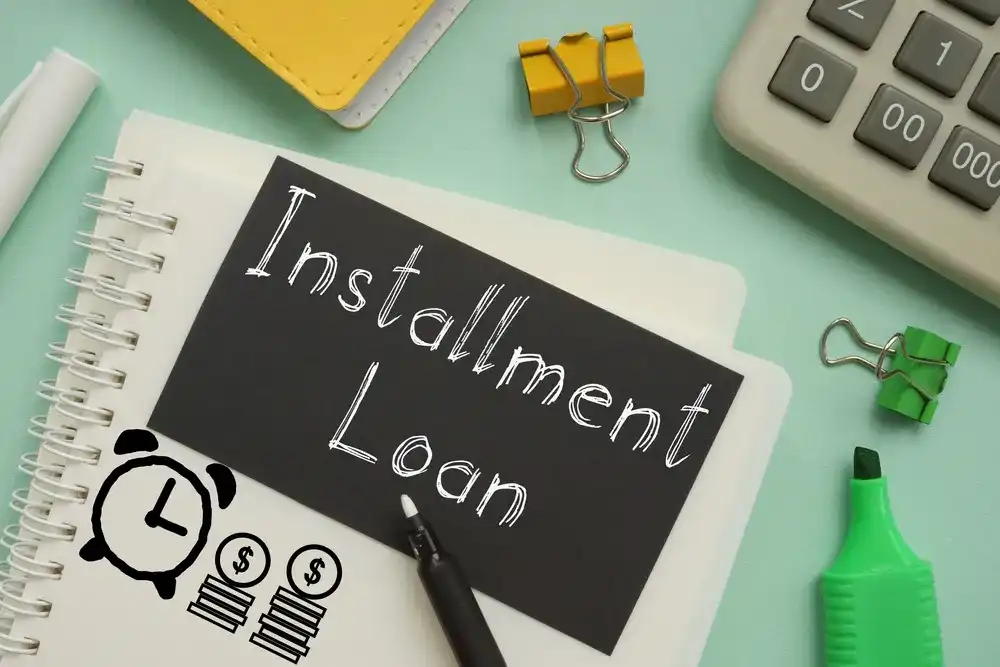Installment vs. Revolving Loans: What’s the Difference?
Whether it's snagging that dream home, fixing up an old car, or even helping a business grow, most of us don't have a pile of cash lying around to make these big purchases or investments. That's where loans come in. These financial lifelines help bridge the gap between our financial capabilities and ambitions. Broadly speaking, loans can be categorized into two main types: installment and revolving.
Installment loans are like a financial handshake, where you borrow a specific amount of money all at once and agree to pay it back in regular, fixed payments. Imagine borrowing a ladder to reach a high shelf, and then returning it one step at a time. Conversely, revolving loans work more like a magical wallet that replenishes itself. You're given a credit limit, and you can borrow as much as you need, whenever you need it, as long as you don't exceed this limit.
In this article, we'll look at installment vs. revolving loans, laying out the differences and highlighting which types of loans fall under each category. As a result, you can walk away with a clear understanding of how each loan type can serve your financial needs.

What’s the Difference Between Installment vs. Revolving Loans?
Towards the end of 2023, approximately 9% of adults, equating to 23.2 million people, were juggling unsecured personal loans. With a total count of 27.8 million personal loans out there, it's clear that many are navigating the repayment of multiple loans simultaneously.
Further, the climate of personal loan rates has experienced a significant upswing over the past year, with predictions suggesting a continuation of high rates before a slight decrease in 2024. The average interest rate for a 24-month commercial bank loan had climbed from 8.73% in spring 2022 to a striking 12.17% currently.
When consumers choose to borrow funds, they typically take either an installment loan or a revolving loan. But what’s the difference? Read on for an explanation of both.
What is an Installment Loan?
An installment loan is a financial commitment where you borrow a fixed sum of money and agree to repay it over a predetermined period. These loans are structured to break down a substantial purchase into smaller, manageable payments, making them ideal for one-time, big-ticket expenses like buying a car, financing a wedding, or consolidating debt.
Once you've paid off an installment loan, the account is closed. This type of loan offers a clear endpoint to your debt, providing a structured path to financial freedom.
What is a Revolving Loan?
On the other hand, revolving loans offer a flexible borrowing option through a line of credit. This setup allows you to borrow, repay, and borrow again up to a specified credit limit, making it an excellent tool for ongoing financial needs such as managing cash flow fluctuations or funding continuous projects.
Credit cards and home equity lines of credit (HELOCs) are common examples. Revolving loans require a sound credit score, especially for higher limits, and offer the convenience of access to funds when needed without reapplying for a new loan each time.
What are the Different Types of Installment Loans?
Installment loan types come in various forms, each designed to meet specific financial needs and goals. From making big purchases to investing in your future, installment loan options offer structured payment plans that accommodate various budgeting strategies.
Let's explore some of the common types of installment loans, including personal loans, auto loans, student loans, home mortgage loans, and the increasingly popular buy-now, pay-later loans, to understand how each operates and serves different borrowing needs.
Personal Loans
Personal loans are a versatile installment loan option that can be used for a broad spectrum of purposes, from consolidating debt to covering unexpected expenses or even a dream vacation. These loans provide a lump sum of money upfront, with a fixed interest rate and repayment period.
Check out our installment loan calculator to see what your payment can be. The predictability of monthly payments makes personal loans an attractive choice for those seeking financial stability.
Auto Loans
Auto loans are tailored for the purchase of vehicles. When you take out an auto loan, you borrow the amount needed to buy the car, and then you repay that amount plus interest over a set period. This type of loan is secured, with the vehicle serving as collateral, which typically results in lower interest rates compared to unsecured loans.
Student Loans
Student loans are designed to support individuals in covering the costs of higher education, including tuition, books, and living expenses. These loans can come from private lenders or the federal government, with varying interest rates and repayment terms. Repayment often starts after graduation, with some programs offering grace periods or income-based repayment plans.
Home Mortgage Loans
Home mortgage loans are specifically for purchasing real estate. They are usually long-term loans, lasting anywhere from 15 to 30 years. The property itself secures the loan, and the repayment terms include interest and principal amounts. Mortgages have various types, including fixed-rate and adjustable-rate, allowing buyers to choose what best fits their financial situation.
Buy-Now, Pay-Later Loans
Buy-now, pay-later loans have emerged as a modern installment loan option, allowing consumers to make purchases and defer payment to a later date or break it into smaller payments without interest. This option is increasingly available for online and in-store purchases, offering flexibility and convenience for shoppers looking to manage their cash flow better.
What are the Different Types of Revolving Loans?
Revolving loans can provide a flexible way to manage finances. These loans provide a continuous borrowing cycle, ideal for various financial situations. However, without proper management of your spending, these loans can also result in a higher payment due than what you might have anticipated.
Let’s take a look at some of the revolving loan types, including credit cards, personal lines of credit, business lines of credit, and margin investment accounts, to understand how each serves unique financial needs.
Credit Cards
Credit cards are one of the most common revolving loan types, offering a line of credit for everyday purchases, from groceries to gas. Users can borrow up to a specified limit, paying interest on the balance if not paid in full each month. This flexibility makes them a staple in financial management.
Personal Lines of Credit
A personal line of credit is a flexible revolving loan that grants access to funds up to a certain limit. It's like having a pool of money to dip into for unexpected expenses or projects. Interest is charged only on the amount used, making it a versatile option for personal financial needs.
Business Lines of Credit
Business lines of credit provide companies with access to a predetermined amount of funds, which can be used for managing cash flow, purchasing inventory, or other operational needs. Like personal lines, interest is only on the amount drawn, offering businesses flexibility and control over their finances.
Margin Investment Accounts
Margin investment accounts allow investors to borrow money from a brokerage to buy securities, using the purchased securities as collateral. This type of revolving line of credit can amplify investment purchasing power, but it comes with higher risks, including the potential for magnified losses.

Check Out Installment Loans Offered by Cash Store
Now that we have explored the differences between installment vs. revolving loans, you are better equipped to make an informed decision regarding future borrowing. As you can see, each option offers unique benefits, whether you're making a significant one-time purchase or managing ongoing financial needs.
Choosing the right loan type is super important, as it should align with your financial goals, preferences, and the specific situation you're in. It's also important to be mindful of any fees and requirements associated with the loan you're considering. With the right information and careful consideration, you can make an informed decision that best suits your needs.
Ready to take the next step in your financial journey? Pre-qualify now by visiting our application page. Whether you're leaning towards an installment loan or a revolving line of credit, we're here to help you achieve your financial objectives.
The content on this page provides general consumer information or tips. It is not financial advice or guidance. Each person’s circumstances are unique. The Cash Store may update this information periodically. This information may also include links or references to third-party resources or content. We do not endorse the third-party or guarantee the accuracy of this third-party information. There may be other resources that also serve your needs.
More Articles
What to Know About Crypto-Backed Loans
Curious about using your crypto as collateral? Discover how crypto-backed loans work, their benefits, risks, and what to consider before borrowing.
Read More >How Does Installment Loan Approval Work?
Curious about how installment loan approval works? Learn about the key factors lenders consider, the application process, and tips to improve your chances of approval.
Read More >Is it Better to Get an Installment Loan or Line of Credit?
Installment loan or line of credit—which is right for you? Learn the key differences, pros and cons, and how to choose the best option for your financial needs.
Read More >Loan Amount is subject to loan approval. Loan terms and availability may vary by location. Approval rate based on complete applications received across all Cash Store locations. Customers can typically expect to receive loan proceeds in less than 20 minutes; however, processing times may vary. Loans / Advances are provided based on approved credit. Each applicant for credit is evaluated for creditworthiness.
Please see the Licenses and Rates page for additional product details.
Cash Store offers consumer credit products that are generally short-term in nature and not intended for long-term borrowing needs.
In Texas, Cash Store is a Credit Services Organization. Loans are provided by a non-affiliated third-party lender. Please see the Licenses and Rates page for links to Consumer Disclosures and choose the one for the product and amount that most closely relates to your loan request.
Customer Portal residency restrictions apply. Availability of funds may vary by financial institution.

